- 0
The Odds of Winning a Slot Jackpot

A slot is a machine with reels that spin when you press a button or lever. The symbols on the reels are compared to a pay table to determine whether it is a winning spin. Winning combinations vary from game to game. Some slots pay out when a single symbol appears on the screen, while others require multiple symbols to appear. Some have jackpots that can be very large. Regardless of the type of slot, it is important to read the pay table before you play.
A symbol is a photo, number, or other icon that can appear on a slot machine’s reels. Each symbol has a different probability of appearing, and the more likely it is to appear, the higher the payout. Most slots have a minimum payout, which is typically 15 coins. This is to keep players seated and betting, and only rarely do machines fail to pay out the minimum amount over several pulls.
The odds of hitting a slot jackpot are one of the main reasons people choose to gamble on them. These odds differ from machine to machine, and can be very high or very low. However, there are some things you can do to improve your chances of winning a slot jackpot.
When you win a slot, you are awarded credits or chips that represent your eligible bankroll at that particular machine. These credits can be exchanged for real cash once you meet the casino’s wagering requirements. These requirements are often listed in the rules of each slot game, but they may also be explained by the dealer or casino host during a game.
While it seems obvious that if you don’t want to lose, you should not sit at a slot unless you are planning on playing it, it’s easy to get distracted at a casino resort. Relaxing by the pool, having one more drink in the lounge, or sharing a story with friends can make it difficult to focus on the game at hand. If you do plan to sit at a slot, try to arrive early. This way, you’ll be able to find a machine that isn’t too busy and will give you the best chance of keeping your mind on the game.
Modern electronic slot machines use a random number generator to determine the sequence of symbols that will land on each reel. When the computer generates a number, it will look for that number on each of the reels. Once it finds the matching location, it will cause the reels to stop at that placement. The symbols in the payline will then determine if it was a winning spin.
The random number generator used by modern slot machines is similar to the six-sided die that casinos use to determine the outcome of a roll. The odds of each side of the die landing are equal, but if there were more sides on the die, it would be less likely to land on a number. This is a principle known as uniform distribution. Slots are not uniformly distributed, but they are designed to distribute money evenly to the casino.